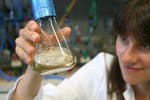Fighting micropollutants with enzymes
Direktzugriff
Artikelaktionen
Sabine Sané. Source: IMTEK
Wastewater treatment requires a considerable amount of energy – and it will further increase if, in the future, micro pollutants such as residues from pharmaceuticals or hormones, need to be removed. These micro pollutants are suspected to have a negative effect on health and the ecosystem. Sabine Sané, a biologist in the Department of Microsystems Engineering (IMTEK) and former scholar of the research training group "Micro Energy Harvesting", has developed a promising new concept for the energy-efficient wastewater treatment using enzymes. She is currently working on her PhD in Sven Kerzenmacher’s Bioelectrochemical Systems Research Group at Roland Zengerle’s Lab for MEMS Applications. Along with three other candidates, Sané was awarded the Huber Technology Prize “Zukunft Wasser” [http://www.huber.de/de/htp2014.html] which is endowed with 10.000 €.
Micro pollutants such as estrogens and antibiotics cannot be completely removed by established wastewater treatment. Currently, the use of activated carbon or ozone as add-ons are being discussed. These concepts are either energy-intensive or are elaborate and costly. Sané’s concept, however, combines two methods: she wants to use enzymes, produced by the tree fungus Trametes versicolor, to both degrade the micro pollutants and to increase the performance of a microbial fuel cell that produces electricity from wastewater. In this way, the energy efficiency of a wastewater treatment plant could be increased and at the same time, pollutants would be reduced.
See German press release of Huber SEhttp://www.huber.de/de/presse/news/news-artikel/news/sieger-des-huber-technology-prize-2014-zukunft-wasser-stehen-fest.html (29.07.2014)
See Sabine Sané's resarch profile
Fußzeile
Benutzerspezifische Werkzeuge

